EXCLUSIVE: Leaked Legal Memo Exposes City Attorney’s Failures & Ongoing Cover Up

A legal memo drafted by outside lawyers for the City that’s been shielded from disclosure for more than a year concluded that San Diego City Attorney Mara Elliott failed to properly vet the 101 Ash Street building in downtown before she approved it in December 2016, and the memo sheds light on an ongoing cover-up to obscure Elliott’s failure to adequately protect taxpayers in the acquisition of the disastrous project – but Elliott has worked to keep the conclusions in the memo hidden.
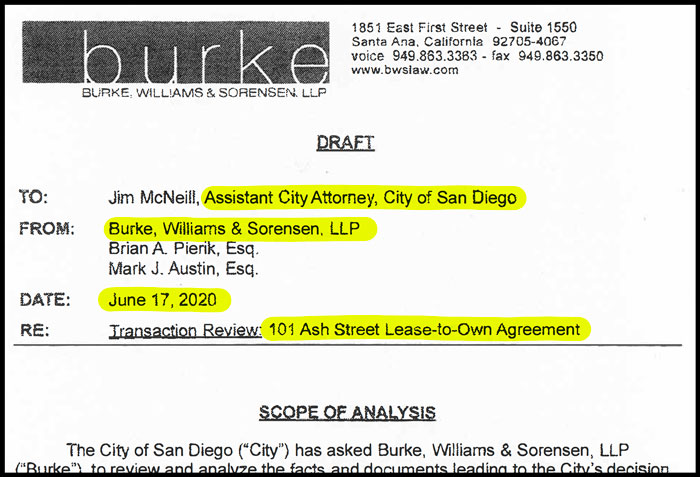
The June 17, 2020 memo, which has never been released to the public in its entirety, was the basis of a news story published by NBC7 on September 3, 2020, which focused on a particular footnote that was quickly disputed by the City and lawyers who wrote the memo, but the remainder of the 26-page memo has not been challenged by either Elliott or the authors.
NBC7 was the only news outlet that claimed to have received a copy of the June 17, 2020, legal memo last year. The reporter who wrote the story, Dorian Hargrove, said he received the memo from an unknown source, but that he had a trusted known source within City Hall confirm its authenticity.
The public dispute over the 15th footnote within the 26-page legal memo kept the media and City elected officials from focusing last year on the full contents of the damaging memo that puts the blame for purchasing the building with asbestos and equipment issues squarely on Elliott’s lack of thorough legal vetting before she approved the deal in December 2016 as the City’s elected City Attorney and Chief Legal Advisor, as empowered by the City’s Charter.
The City acquired the 19-story office tower through a 20-year lease-to-own agreement with Cisterra Development that, in turn, was buying the building from Sandor “Sandy“ Shapery and “Papa” Doug Manchester.
For over a year, the memo has been concealed from the public as a privileged document ostensibly to protect the City from legal liability in pending lawsuits, but keeping the memo hidden has allowed City Attorney Mara Elliott to obscure her failure to properly vet the building transaction and to adequately protect taxpayers from the enormous financial downside of the transaction. Elliott has continued to manage the City’s response to the debacle to mitigate her exposure from numerous lawsuits that could cost the City over $200 million.
This is now the second legal document prepared by outside law firms asked by the City to review the troubled building deal that has been proven to have been kept from the public amid growing legal troubles for the City caused by the numerous problems with the building that went undiscovered until after the City had acquired the building.
La Prensa San Diego has a full copy of the June 17, 2020, memo that appears to be the same version used by NBC7 for its September 3, 2020, story. A review of the memo and excerpts from the actual document are included within this story.
OUTSIDE LAWYERS FIND FAULT
The memo, prepared by the law firm of Burke, Williams & Sorensen LLP in June 2020 at the request of the City, reviewed the troubled transaction after the building was evacuated due to exposure of asbestos material.
The memo found that the City relied exclusively on information about the condition of the building provided by the sellers and the landlord company without conducting any of its own condition assessment reports or inspections, which was especially risky to the City because the lease accepted the building “as-in” and released the sellers and landlord from any liability for defects of the building.
“Although it is customary for a purchaser to rely on reports provided by the seller, a contract containing strong exculpatory provisions against the seller’s nondisclosures (such as the Lease Agreement here) counsels towards the purchaser commissioning its own reports for confirmation, for the exculpatory provisions in the contract have the effect of rendering the seller’s representations of little or no value,” the memo states.

“Thus, under best practices, the City should likely have commissioned its own reports here, rather than relying exclusively on the reports commissioned by Cisterra,” the memo concluded. The lawyers writing the memo used bold text to highlight especially important language in the document, as in the actual text of the document shown above.
The memo points out that the City relied exclusively on representation and documents received from Cisterra who was simply flipping the building in a simultaneous escrow close by financing the purchase using the projected revenues from the City’s signed 20-year as collateral. Cisterra had never occupied or operated the building so it had no first-hand knowledge of the true conditions of the building.
“Moreover, this exclusive reliance on Cisterra, and the use of Cisterra as a ‘middleman’ to obtain the Property from the prior owner, creates an additional problem, in that it acts as a potential liability shield for both Cisterra and the prior owner, for which Cisterra acts as an effective ‘buffer’,” the memo states. “Indeed, Cisterra’s limited role as a temporary transferee, together with the strong exculpatory provisions in the Lease Agreement, would have specifically dis-incentivized Cisterra from conducting a proper due diligence, so it could remain ‘deliberately ignorant’ of the Property’s condition,” the report reads on Page 21. The use of bold and underlined text above appears in the actual text of the legal memo.
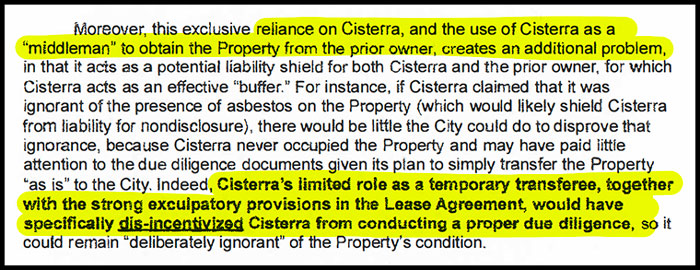
The memo further explains the legal protections the City gave up by utilizing a lease-to-own agreement instead of purchasing the building directly from the sellers, Shapery and Manchester. Shapery had owned the 101 Ash building for 23 years and had complete knowledge of its true conditions at the time of the negotiations with the City and Cisterra, and is usually referred to as the former owner and “seller”. Manchester only invested in the building in the last two years before the City’s acquisition.

“In contrast, had the City purchased the Property directly from the prior owner, the City could have known, based on the prior owner’s long ownership history, that the City could obtain a full and complete picture of the Property’s condition. Moreover, the City could file a lawsuit against that prior owner if any of the disclosures were inadequate or the Property was otherwise defective,” the memo reads.
The Burke lawyers concluded that the lease structure limited the City from seeking information from sellers or suing the sellers for misrepresentations or defects in the building because the sellers were not a party to the lease agreement with the City, and the City had no direct negotiations with the sellers, primarily represented by Shapery, the long-time owner of the building.
“In contrast, with Cisterra as a ‘buffer’, the City has no option to seek any information or remedies from the former owner,” the memo reads.
DISPROPORTIONATELY UNFAVORABLE TO THE CITY
The outside lawyers were also asked by the City to review the terms of the lease agreement to analyze whether the deal was customary for real estate transactions of this nature. The memo found that the terms of the deal were “disproportionately unfavorable to the City”.
“Here, it is this office’s opinion that the terms of the lease Agreement were, in fact, disproportionately unfavorable to the City, on the specific issue of the exculpatory provisions in favor of Cisterra,” the outside lawyers found. “Under these circumstances, it was particularly dangerous for the City to release Cisterra from liability for any of its representations (which is what the Lease Agreement does on its face) and/or to accept the Property ‘as is’,” the memo reads.

The memo also states that the deal terms releasing Cisterra and the sellers from any liability prevents the City from suing for defects or deficiencies in the building unless the City could prove Cisterra committed “fraud or misrepresentation”, but the memo also states that no evidence has been presented that Cisterra “failed to provide any known information to the City regarding the Property or its condition.”
“In the event the City were to contemplate legal action against Cisterra regarding the adequacy of the disclosures made by it prior to the lease Agreement (e.g., the adequacy of its disclosures regarding the nature or extent of asbestos on the Property), these exculpatory provisions would likely preclude such action given their strong terms,” the memo reads on Page 25.

“However, noted above, this office has been given no evidence to support such a claim of misrepresentations or nondisclosures by Cisterra in relation to this transaction,” the memo concludes on Page 26.
The legal memo also offers contrasting legal advice it would have given had the law firm been involved in the legal review of the lease agreement before it was executed and approved in 2016 to help protect the City from unknown problems with the building which eventually came to light after the transaction.

“As an alternative to what occurred here, this office would have recommended that either (1) the City conduct the additional due diligence investigation suggested in this report, or (2) require specific disclosures and representations on important issues (such as the Property’s condition) from Cisterra, and make those representations a binding part of the contract,” the memo reads.
The memo also raised issues with the City’s failure to adequately investigate potential issues with asbestos in the building which were explicitly excluded from a 2016 Phase I environmental review provided to the City by Cisterra, as well as language in a 2014 Phase I report which stated that “In the event that building renovation or demolition activities are planned, a thorough asbestos survey is required in accordance with the EPA NESHAP 40 CFR Part 61 prior to demolition or renovation activities that may disturb [asbestos containing materials].” The Burke lawyers added the bold and underlined emphasis in the memo.
The legal memo concludes that the renovations, which were anticipated before the lease was signed, should have triggered the City to conduct a Phase II environmental review of the building before signing the deal which would have revealed the potential problems with asbestos.
“Here, the City deviated from this principle by failing to conduct city-commissioned analysis to further explore the impact that remodeling the Property would have on the asbestos that existed on the property,” the memo reads. “City staff had sufficient information to mandate conducting a “Phase II Environmental Assessment” or other appropriate analysis to review the Property for the full extent of asbestos for a prudent investigation of the transaction,” the memo concludes on Page 17.
After the building deal was signed, the City began over $30 million in renovations to expand the occupancy capacity to accommodate up to 1,300 employees from the 850 capacity the building was designed to hold.
During the renovation work, construction disturbed encapsulated asbestos material that became airborne and posed serious health risks to construction workers and the planned occupants of the office tower.
In 2019, a worker for the building management company overseeing the renovations alerted the County Air Pollution Control District (APCD) to the loose asbestos. Testing revealed dangerous levels of asbestos which eventually led to the APDC declaring the building a “public nuisance” and forced the evacuation of City employees in January 2020.
The building has remained unusable since January 2020.
The legal memo’s conclusions point directly to the lack of proper legal review by Elliott and her failure to adequately advise the City Council about the outsized financial risks associated with the lease deal and unusual exculpatory language protecting Cisterra and the sellers at the expense of taxpayers.
WHAT DID FOOTNOTE 15 SAY?
The section of the memo leading up to the footnote is titled “B. Analysis of City’s Review of Transaction” and examines the “history of the transaction” that “gives rise to other concerns regarding the City’s overall structure and review of the transaction” the memo reads on Page 18.

The memo questions why the City chose to utilize a lease deal instead of purchasing the building directly which would have “saved the City at least $17 million” and reviews reasons City staff gave at the time for not purchasing the building directly.
But the outside lawyers state that “there are at least some questions raised by these explanations that are not answered by the known facts”. This is the point in the memo where the disputed Footnote 15 is cited. The last sentence leading to the citation jumps from Page 18 to Page 19.
Some have questioned the large blank space at bottom of Page 18, but document experts explain that Footnote 15 would not fit entirely on this page so it forced a page break and left a larger space than usual. This has been confirmed by two document experts.
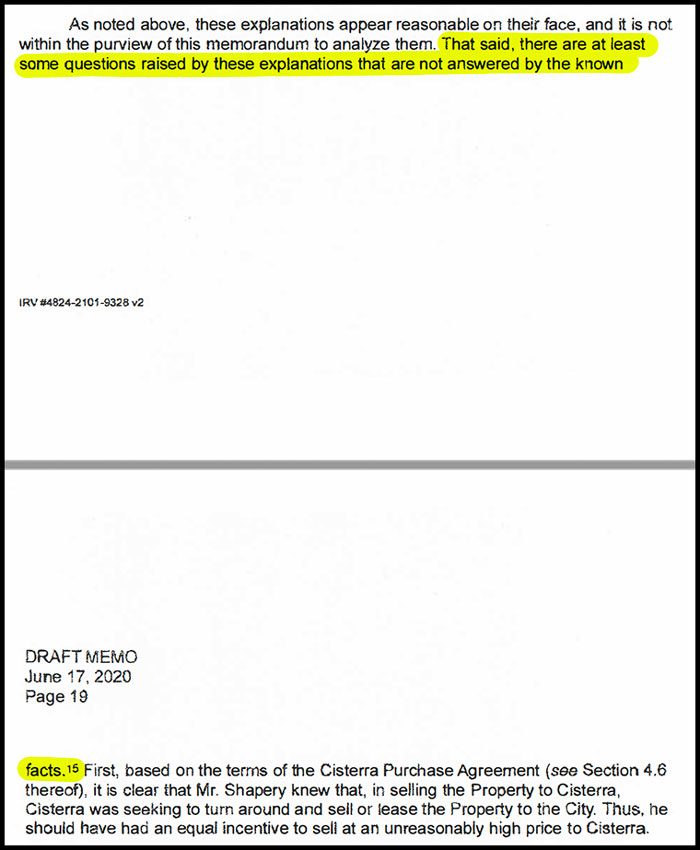
The disputed footnote questions why the decision may have been made to pursue a lease rather than a purchase and seems to fit the line of reasoning outlined in the three paragraphs leading up to the citation.
“One question is whether Ms. Thompson, Deputy COO Ron Villa, COO Scott Chadwick, and a member of the City Council misrepresented the transaction to the public and other members of the City Council,” the disputed footnote reads. “According to an email from Mr. Villa on September 1, 2016, there was a belief that ‘we will not be able to achieve approval for a purchase at the $72m price’ and ‘the fact remains that the general public and policy makers may not be able to get behind paying more for the building then the ‘appraised value’,” the footnote reads.
The footnote language then raised the issue that seems to have set off the political reactions to the disputed footnote last year. The footnote questions why then-Councilman Todd Gloria flipped from opposing a lease structure when the City purchased a building the year before the 101 Ash deal was approved.
“Apparently on September 16, before the revised transaction was scheduled to be presented to a City Council Committee. Ms. Thompson and Mr. Villa met with Council President Todd Gloria and two of his staff members for an ‘update’ on the transaction,” the footnote reads. “Mr. Gloria had previously been skeptical about the lease-to-own structure when it was used for a prior acquisition, but was supportive of the 101 Ash transaction when it came to the Committee and made the Council motion to approve the Lease Agreement,” the footnote stated.
The end of the footnote then states that knowing more about the discussions between Gloria and key staffers pushing the lease deal “could be informative”, but that the lawyers were “unable to obtain the City Attorney’s approval to interview Mr. Gloria or his staff.”
“The discussions during the update could be informative about why the City went forward with the transaction despite the unfavorable language in the lease Agreement, the due diligence materials available to the City, and the substantially higher cost of the lease-to-own structure,” the footnote states. “However, we were unable to obtain the City Attorney’s approval to interview Mr. Gloria or his staff (all of whom are no longer in the employ of the City).”
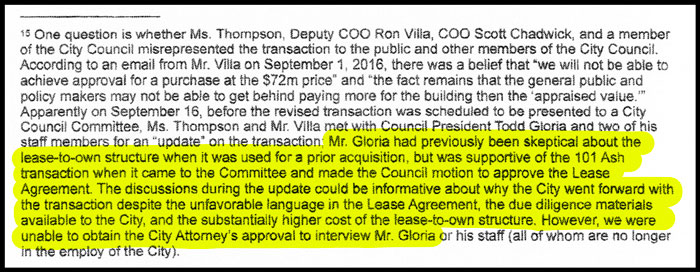
The next four paragraphs in the body of the memo after Footnote 15 examine the three main arguments used by City staff to justify a lease over a purchase, and the lawyers concluded that the end result was worse for the City.
“Overall, these facts give rise to the potential that Cisterra received a better deal from the City than the City could have otherwise negotiated. Indeed, despite the potential for a purchase of the Property directly from the former owners, and the lack of necessity of Cisterra’s involvement in the transaction, the end result was that the City leased-to-own the Property from Cisterra, and that Cisterra made a substantial profit merely by acting as a conduit,” the memo concludes on Page 20.
FOOTNOTE 15 QUESTIONED, BUT NOT REST OF MEMO
The footnote used by NBC7 was quickly disputed the City Attorney Mara Elliott and a lawyer for Burke, Williams & Sorensen LLP, with both saying the footnote was not in the official memo sent to the City and claiming that the footnote was “fabricated”, but no one ever produced any evidence to show that the document was altered by anyone not involved in its creation.
And more importantly, the denials of the footnote’s authenticity did not relate to the body of the memo; in fact, none of the statements made by Elliott or the Burke lawyers ever questioned the validity of the entire 26-page memo.
On the same day the NBC7 story first ran, Brian A. Pierik, one of the two Burke lawyers who signed the memo, issued a letter to then-Mayor Kevin Faulconer claiming the footnote in the NBC7 story was “completely fabricated”, but admitted that “our Memorandum has been doctored to add Fabricated Footnote 15” without disputing the rest of the memo.

Then Pierik sent a letter to NBC7 just three days later claiming the footnote was “completely and totally fabricated” and again seeming to admit the memo was authentic expect for the footnote, writing that it was “absolutely clear that our Memorandum has been doctored to add the Fabricated Footnote 15.”
Neither of Pierik’s letters claimed that the memo itself was fabricated or even challenged the remainder of the 26-page memo used by NBC7.

Pierik and Mark. J. Austin, the other Burke lawyer who signed the memo, both submitted identical statements to NBC7 declaring “under penalty of perjury” that “Footnote 15 as it appeared and was presented in the Article (hereinafter, the “Fabricated Footnote 15″) is completely and totally fabricated, and was not included in any Memorandum from the Burke firm to the City” but again did not dispute the contents of the memo.
Even the spokeswoman for Elliott called the memo “doctored”, but did not refute the rest of the memo.
“It’s clear the doctored document NBC relied on was fabricated,” Hilary Nemchik told NBC7, but added that “Mara Elliott has always been San Diego’s taxpayer watchdog on complex city projects, including ones she inherited, such as 101 Ash Street.” Those comments seem at odds with the conclusions of the memo that Elliott and Nemchik were careful not to repudiate.
NBC7 eventually reviewed a copy of the actual memo provided to the outlet by the City and concluded that most of the information in the memo was identical, except for Footnote 15 on Page 19, three other footnotes added to Page 24, and one corrected typographical error.

The three other footnotes only contained language from the signed lease agreement as references, but no other text that would be considered legal advice or conclusions.
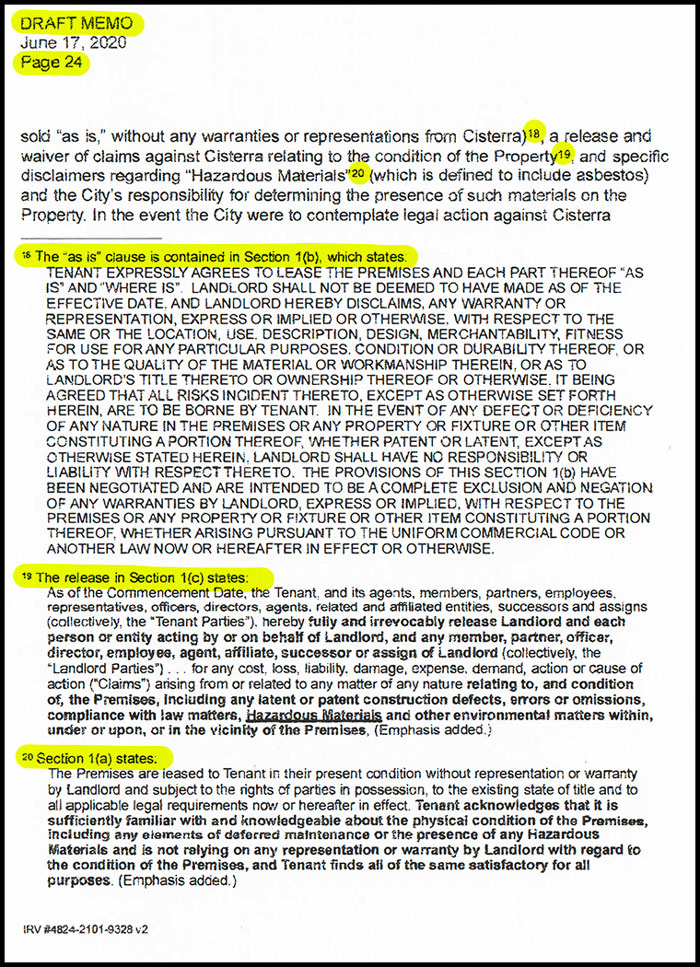
But, regardless of the disputes over the footnotes, the body of the memo is not changed by the addition or removal of the footnotes. The legal review and conclusions of the Burke lawyers are not affected by the disputed notes. As in most cases, the footnotes only give additional information, references, or clarification to language in the body of a memo.
MEMO QUESTIONS ELLIOTT’S LEGAL WORK
The conclusions in the report raise serious questions about the legal work performed, or more importantly, not performed, by City Attorney Mara Elliott before she gave final approval of the lease deal.
Elliott was elected as City Attorney on November 8, 2016, and had access to all materials within the City Attorney’s office for the month between her election and her swearing in on December 12, 2016. She waited an additional week before she provided the final signature on December 19, 2016, to make the 20-year lease legally binding.
After the building deal became controversial in 2019, Elliott began to distance herself from responsibility for the deal by saying it was approved before she was elected by trying to define the “approval” as the first City Council vote, which occurred on October 14, 2016, and the second and final vote of the Council that occurred on November 14, days after the election where Elliott won, but before she was sworn in a month later.
Elliott has also described her role in approving the deal being only “as to form”, implying that her role was purely ministerial and perfunctory in an attempt to lessen her involvement or responsibility.
But legal memos issued by the City Attorney’s office in 2009, 2012, and 2016 all conclude that no City contract is legally binding or valid without the signature of the City Attorney’s office. Elliott worked within the City Attorney’s office when all of those legal opinions were issued and those were binding on her when she signed the lease deal.
“The Charter requires the City Attorney’s signature in order to properly execute a City contract,” a Memorandum of Law dated December 18, 2009, states. “Therefore, the City Attorney’s signature is also necessary to the formation of a valid contract.”
And a Memorandum of Law dated July 8, 2016, while Elliott was running for City Attorney, point out that San Diego’s “independent City Attorney is a hallmark of the City’s municipal government structure” and specifically mentions that the position is not subordinate to the City Council.
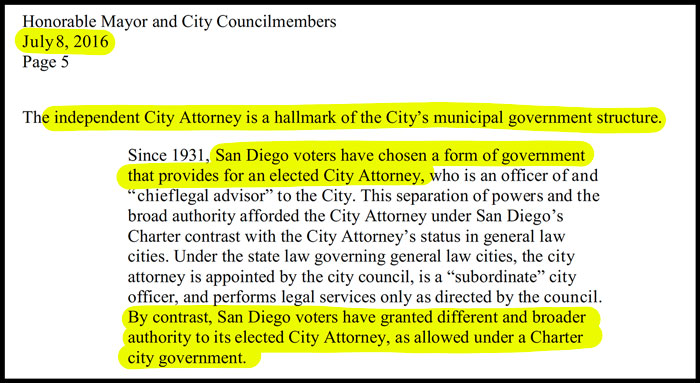
“Since 1931, San Diego voters have chosen a form of government that provides for an elected City Attorney, who is an officer of and “chief legal advisor” to the City. This separation of powers and the broad authority afforded the City Attorney under San Diego’s Charter contrast with the City Attorney’s status in general law cities. Under the state law governing general law cities, the city attorney is appointed by the city council, is a “subordinate” city officer, and performs legal services only as directed by the council. By contrast, San Diego voters have granted different and broader authority to its elected City Attorney, as allowed under a Charter city government.”
This year, Elliott filed lawsuits to suspend the monthly lease payment of $545,000 during the period the building has been unusable, and she later filed lawsuits to challenge the validity of both the 101 Ash and the Civic Center Plaza lease signed one year earlier, claiming both are unlawful because the City’s volunteer real estate broker, Jason Hughes, has now admitted he received a combined $9.4 million in profit sharing from Cisterra on the two deals.
The fees by Hughes may be a violation of California’s conflict-of-interest laws known as Government Code Section 1090, which punishes anyone who participates in the making or approval of a government contract in which they also have a financial interest.
Whether Hughes is charged or convicted of a Section 1090 violation or other laws related to his participation in the deal does not affect the conclusions outlined in the Burke memo.
CITY ATTORNEY’S OFFICE THREATENED HARGROVE
After NBC reporter Hargrove received the memo, he reached out to Elliott for comments on the story, but he was instead threatened with criminal prosecution by her office.
Hargrove received a “Criminal Investigation” letter from Deputy City Attorney John Hemmerling, stating that he had “initiated a criminal investigation” because the “unauthorized release of confidential documents and information is a criminal violation of the City’s Ethics Ordinance, the Government Code, the Penal Code, and if received or sent via electronic method, a violation of state and federal electronic communications acts.”
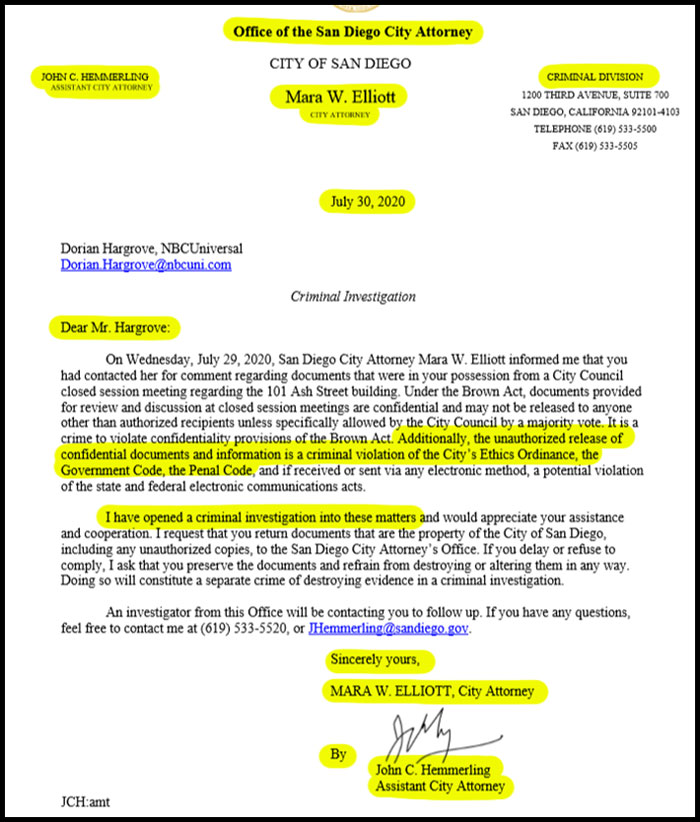
Hemmerling, a lawyer and former San Diego Police Department officer, is the head of the Criminal Division of the City Attorney’s Office which prosecutes misdemeanor criminal cases.
The day after the Criminal Investigation letter was sent to Hargrove, Elliott retracted the letter and clarified that she has never and will never prosecute a journalist.
“The letter my office sent earlier to an NBC reporter never should have been sent,” Elliott posted on Twitter. “My office has never – and will never – prosecute a journalist or compel them to reveal confidential sources.”
Hargrove confirmed that Elliott called him directly to clarify he was not under investigation. Elliott claimed the Criminal Investigation letter was a “form letter” meant for potential witnesses, but not for reporters.
NBC RETRACTED PARTS OF ITS STORY
After Elliott and Burke lawyers disputed Footnote 15 used by NBC7, the reporter could not confirm his sourcing of the memo, and NBC was forced to retract the part of the story related to the disputed footnote. Hargrove maintained that he had asked another source for confirmation of the validity of the memo, but that a “miscommunication” resulted in an error.
Hargrove later clarified that he received a first copy of the memo from a person who had received it from an unknown source, then Hargrove asked a trusted known source within San Diego City Hall for another copy of the memo. When Hargrove received a copy of the memo in the mail with no traceable clues as to the sender, Hargrove asked the second source to confirm the mailing, but he failed to explicitly confirm that the person sent the memo in question.
Later, after the footnote was challenged by Elliott and the Burke lawyers, Hargrove contacted the second source to confirm the document, but the source disavowed having sent the memo, leaving Hargrove without concrete confirmation as to the authenticity of the memo.
NBC7 retracted portions of the story on September 21, 2020, saying that “NBC 7 is retracting a previously reported story that relied in part on a document that was “fabricated,” according to the law firm that wrote the primary report. NBC 7 chose to retract this story and explain our further reporting for transparency. We apologize for the error and will continue our reporting into who sent NBC 7 a doctored report.“
Although NBC referred to the document as “fabricated“, that characterization was attributed to “the law firm that wrote the primary report.” Other media outlets, including the Voice of San Diego and the San Diego Union-Tribune, later characterized the footnote as “fabricated” without clarifying that the contents in the body of the memo itself was never called into question.
The San Diego Union-Tribune Editorial Board later called on the source to be revealed, as did Voice of San Diego reporter Andrew Keatts during a podcast on September 11, 2020. Several journalists agreed that the source had either burned Hargrove or had purposely forwarded a doctored memo with a fabricated footnote.
Some journalists argue that Hargrove has an obligation to protect the identity of his source as a main tenet of journalistic ethics, but others counter that the source has disavowed the memo and therefore provide nothing which Hargrove is obligated to keep confidential.
Some City Hall insiders have long suspected the source who leaked the memo was either someone inside the City Attorney’s office who was unhappy with the direction the office was taking with the reports, or someone within Mayor Kevin Faulconer’s Administration who faulted Elliott for taking control of the investigations and controlling information about the failed building deal which created political headaches for Faulconer.
To date, no one has come forward as the source and Hargrove has not disclosed the identity of his source.
Hargrove recently filed a federal civil rights lawsuit against the City of San Diego, Elliott, and Hemmerling, claiming violations of his 1st and 4th Amendment rights, defamation, interference with economic opportunity, and infliction of emotional distress. Depositions and discovery requests in that case may lead to the exposure of the source or sources who provided information related to the memo to Hargrove.
DAMNING CONCLUSIONS HIDDEN
The memo calls out Elliott for her failure to ensure that the building was properly inspected before the deal was signed, her approval of lease language that was disproportionately unfavorable to the City, and her failed to adequately advice and caution to the City Council as to the financial risks associated with the lease.
The memo was written and submitted to the City in June of last year just as Elliott was in the middle of an re-election campaign, and then-Assemblyman Todd Gloria was running for Mayor against then-Councilwoman Barbara Bry. At the time, the race for Mayor was close, with both Gloria and Bry trading barbs over the still-emerging 101 Ash debacle.
When the NBC7 article was published and Footnote 15 was questioned, Gloria accused Bry of having benefited from the negative story by using paid advertising on social media to promote the article. Bry stopped the ads the day after the story was retracted by NBC.
The political accusations over the disputed footnote caused a distraction that allowed the memo to escape further scrutiny and it soon faded from attention.
A subsequent report by the law firm of Hugo Parker LLP was released on August 6, 2020, and became the only public report on the growing financial scandal. Then-Mayor Kevin Faulconer called the report an “independent review” but La Prensa San Diego later reported that emails showed Elliott’s office had received draft versions of the report and provided edits to remove details that could damage the City’s legal position in lawsuits.
City Chief Operating Officer Kris Michell presented the Parker report at a full Council meeting and called the report an “independent review” and James Parker presented his report as a “forensic review”.
“Mayor Faulconer called for an independent review of the Ash Street project to determine what happened and this January you authorized Hugo Parker and other firms to investigate any and all aspects of the project for a full public accounting,” Michell said.
But Elliott’s own spokeswoman later admitted that Parker was not hired to conduct an independent investigation.
“Jim Parker was hired by the City as outside counsel to represent the City in litigation. He was not hired to do an independent investigation,” Nemchik admitted, directly contradicting the statements of both Michell and Parker during the August 6, 2020 presentation at City Council.
The process the City Attorney used to monitor and manage the Parker report now seems very similar to the process used for the earlier Burke memo. It is now clear that at least two draft versions were sent to the City Attorney’s office before a final memo was sent by Burke.
In both cases, damaging details were removed from the reports or memo, ostensibly, according to Elliott, to protect the City’s legal position in lawsuits, but more concerning, the sanitized versions of the reports helped to conceal Elliott’s failure to perform usual and customary legal reviews expected in real estate transaction of the size and scope of 101 Ash St.
Elliott’s failures as the City’s chief legal advisor seem to have opened the City, and therefore, taxpayers, to growing financial exposure due to the myriad issue related to the building’s condition, but, according to the findings of the Burke memo, those issues could have been prevented with reasonable due diligence before the deal was signed.
Two legal experts consulted for this story point to Elliott’s use of privileged communications with City Council members and warnings that disclosing details of the transaction would damage the City’s legal position as being helpful to conceal Elliott’s direct role in approving the lease language and also failing to adequately advise them of potential financial risks before the deal was signed.
Both experts cautioned that Elliott should not be involved in investigations looking into the origins of the building acquisition because she was instrumental in the formation of the deal and has been involved in advising staff and the Council on all steps taken since then.
Although the City Charter authorizes the City Council to hire its own lawyers in situations of a conflict with the City Attorney, Elliott recently issued a legal opinion that only she can decide if she has a conflict in any given situation, and, even in the case of a conflict, she argues that only she can hire outside law firms and that she would still oversee those outside lawyers even in a case of a conflict of interest.
It is not clear if the City Council will seek outside legal advice without involving Elliott.
Only Councilman Chris Cate was on the City Council when the lease deal was approved in 2016. Three other Councilmembers (Jennifer Campbell, Monica Montgomery-Steppe, and Vivian Moreno) were elected in 2018 before the building was evacuated and the remaining five were elected last year, including Councilmembers Joe LaCava, Stephen Whitburn, Raul Campillo, Marni von Wilpert, and Sean Elo-Rivera.


 Arturo Castañares
Arturo Castañares





